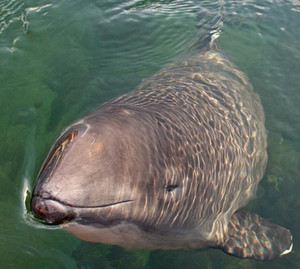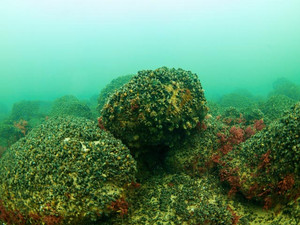Healthy oceans are essential for human wellbeing, biodiversity and a healthy climate. They provide vital ecosystem services and guarantee our prosperity and health. We need to protect the oceans to protect ourselves.
Marine protected areas are an important policy tool for protecting vulnerable marine species and habitats. They contribute to the survival and reproduction of species by preserving keystone habitats such as spawning grounds and nursery areas. These sanctuaries allow animals to grow older and larger, thus enhancing fishery yields in adjacent unprotected areas, while tourism benefits from the greater biodiversity. However, despite formal protection status, the oceans are currently in a poor environmental condition due to overexploitation. This has strong adverse impacts on marine life as well as on fishing communities and other industrial sectors. This also affects the transboundary and ecologically important marine protected area complex of the Pomeranian Bay, located in the southern Baltic Sea.
Deutsche Umwelthilfe therefore organised a transnational conference, which gave German and Polish stakeholders the opportunity to discuss the transboundary management of effective marine protected areas and sustainable fisheries in the southern Baltic Sea.
The conference was split into three main topics:
1) The benefits of effective marine protected areas for nature and humans
Studies on the possible impacts of effectively protected areas were presented and discussed. In addition, we discussed the reasons for opposing zoning concepts and no-take areas that different stakeholders might have, in order to find solutions to reduce such reservations.
2) Ecosystem services of marine protected areas and healthy oceans
Our aim was to raise awareness of the importance of healthy seas. In addition to gaining an overview of the current state of knowledge on the topic, we zoomed in on the following questions: Which ecosystem services can marine protected areas provide, if well managed? Under which circumstances is this possible? How important are the oceans for the climate? How is the oceans' relevance for the global climate incorporated into Polish and German administration and policy?
3) Fisheries and marine conservation
Fisheries are the single greatest direct anthropogenic stressor on marine ecosystems. Therefore, the goals of the EU Biodiversity Strategy 2030 – 30 percent protected areas within the EU, of which 10 percent are strictly protected - have to involve and consider fisheries. Against this background, we addressed fisheries management in the Natura 2000 sites in the Baltic Sea, measures to rebuild the eastern cod stock as well as fisheries control methodes in order to find cooperative solutions with fisheries.
The Baltic Sea is currently in a poor environmental condition due to severe anthropogenic overexploitation. Overfishing, pollution, eutrophication and climate change are threatening marine ecosystems and their biodiversity. This is also affecting the transboundary and ecologically important marine protected area complex “Pomeranian Bay”. Located off the coast of Western Pomerania and Poland, it is part of the territorial waters and Exclusive Economic Zones (EEZ) of Germany and Poland. The area provides crucial resting, feeding and moulting habitat for about 1.25 million seabirds. It also serves as an important feeding ground for the highly endangered population of the harbour porpoise of the Central Baltic Sea. 
© Sven Koschinski/Fjord & Baelt Kerteminde, DK
Despite formal protection status, to date, hardly any effective conservation measures are in place: management plans for the German marine Natura 2000 sites in the EEZ of the Baltic Sea are still being finalised and are yet expected to be released. In Poland, preparation of the marine Natura 2000 management plans is still at a regional coordination level. Furthermore, commercial fisheries cannot be regulated by national protected area regulations; this is only possible within the framework of the EU Common Fisheries Policy (CFP) Article 11 procedure, which requires consensus among all affected fishing nations.
Marine protected areas with zones excluding any extractive activities, i.e. no-take zones, have proven to benefit marine fauna and flora worldwide. They contribute to an increase in fish abundance by providing important refuges and spawning grounds. Following spillover of fishes into non-protected areas, fisheries catch yields can increase outside these no-take zones, thus promoting an economically and ecologically sustainable development. 
© Wolf Wichmann
The conference provided an opportunity for transnational discussions among Polish and German representatives from government and public authorities, fisheries, tourism, environmental associations, academia and the interested public that stimulated the development of practical solutions to existing challenges. The framework for this exchange was provided via a combination of high-level presentations (including EU-Commissioner Virginijus Sinkevicius, HELCOM Executive Secretary Rüdiger Strempel, and Prof. Hans-Otto Pörtner), stimulating panel discussions and focused work in small groups. The consensus on the importance of a sustainable, transnational management of our marine resources was enormous. We would like to use the momentum created by this solution-oriented dialogue to maintain the transboundary exchange and to further develop solutions for the effective protection of the Pomeranian Bay – for example, through an alliance with interested coastal fishermen.
The presentations of all speakers can be downloaded in PDF format (right column on this site). In addition, the keynote presentations are available as video recordings in Polish, German, and in some cases in English as well. We would like to thank all speakers and participants for the extensive exchange, the new impressions, and interesting approaches to solutions. If you have any questions, please contact Dr. Katharina Fietz (fietz@duh.de) and Katrin Quiring (quiring@duh.de) by email.
Documents & Downloads
Contact
 © Steffen Holzmann
© Steffen Holzmann Ulrich Stöcker
Teamleiter Wildnis und Naturkapitalungen
E-Mail: Mail schreiben
 © M. Krag
© M. Krag Dr. Katharina Fietz
Fachreferentin Meeresschutz
E-Mail: Mail schreiben
Keynotes
Funded by:


